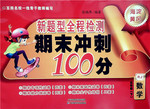题目内容
John ________the man _______ be set free.
- A.defended…referred
- B.demanded… referred to
- C.argued …referring to
- D.reacted … referring
B
这题考查虚拟语气的用法:因为宾语从句的动词是be动词,所以选用动词demand,refer to是过去分词做定语,修饰the man,句意是:约翰要求被提到的人被释放。选B。
这题考查虚拟语气的用法:因为宾语从句的动词是be动词,所以选用动词demand,refer to是过去分词做定语,修饰the man,句意是:约翰要求被提到的人被释放。选B。

练习册系列答案
 新题型全程检测期末冲刺100分系列答案
新题型全程检测期末冲刺100分系列答案
相关题目